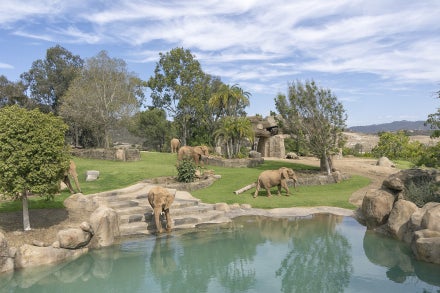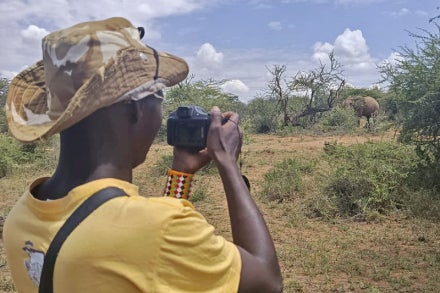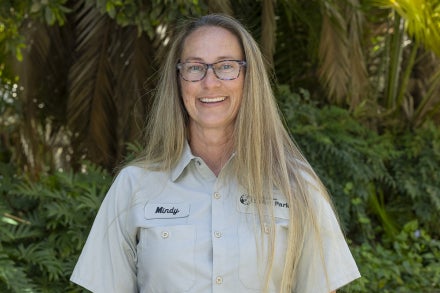
Zoo InternQuest is a seven-week career exploration program for San Diego County high school juniors and seniors. Students have the unique opportunity to meet professionals working for the San Diego Zoo Wildlife Alliance, to learn about their jobs, and then blog about their experience online. Follow their adventures here on the Zoo’s website!
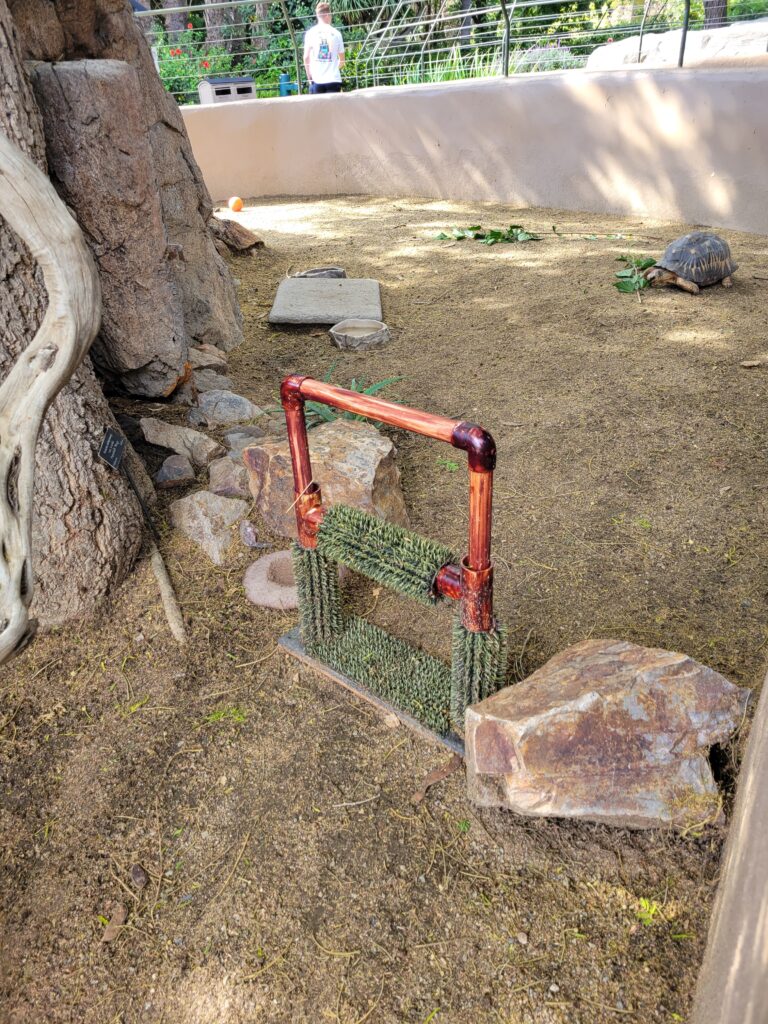
In the second week of the Zoo InternQuest, the interns were able to meet Ms. Rachael Walton, a Wildlife Care Specialist who works with reptiles. Ms. Walton took the interns on a trip through Reptile Mesa where they had the chance to meet many native and exotic lizards, frogs, turtles and tortoises. Throughout the tour, Ms. Walton tells the interns about her experience training, handling and breeding the reptiles at the San Diego Zoo.
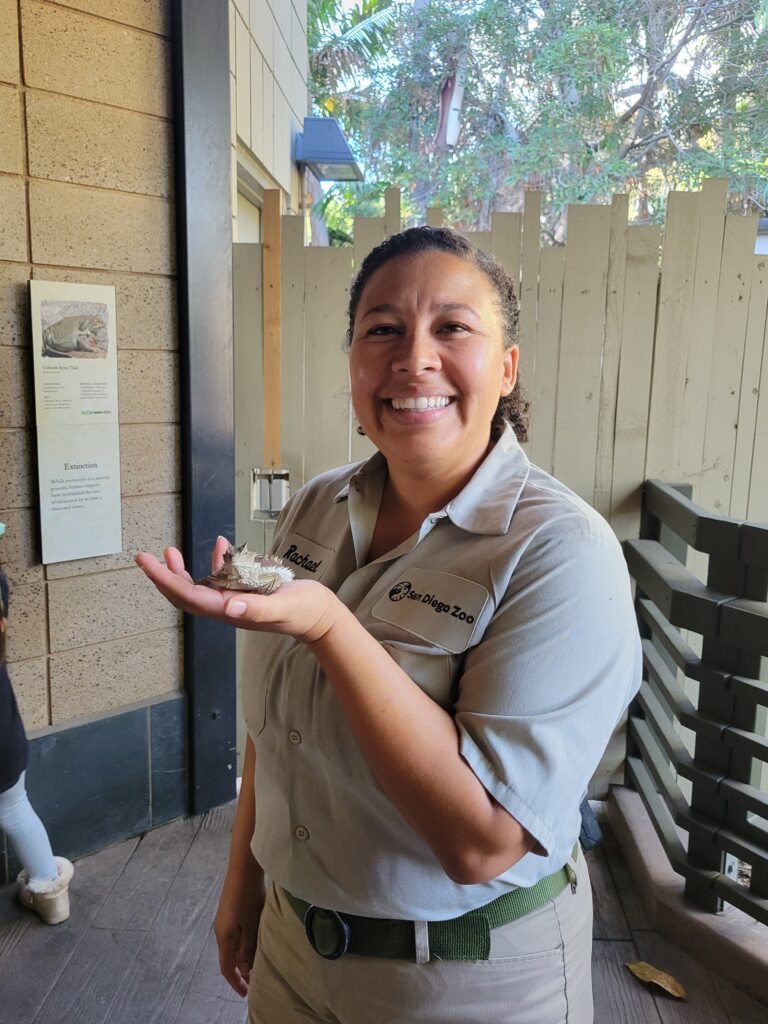
Ms. Walton always had a fascination with reptiles growing up. Raised in San Diego, she spent much of her childhood at the Zoo, where she recalls being enthralled by the reptiles she saw. Knowing that each and every reptile was differentiated by a unique set of adaptations and characteristics captivated her, and since then, Ms. Walton knew she desired a career where she could pursue those interests. She proceeded to go to San Diego State University where she earned both her master’s and bachelor’s degree in biology. While in school, she worked in a veterinary hospital, thinking she would pursue a career as a veterinarian, but her experiences in college helped her discover that she solely wanted to work with reptiles. She held a variety of internships, ranging from the Natural History Museum, where she helped revamp their collections of specimens, to field work in Texas where she worked with a wide variety of snakes. With her experience, she acquired a job at the Zoo where she has now worked for ten years. Ms. Walton works in the Department of Herpetology and Ichthyology where she utilizes husbandry and propagation techniques for a plethora of reptiles, amphibians, and fish. As a Wildlife Care Specialist, Ms. Walton is responsible for maintaining the health of specific species as well as ensuring the proper maintenance of their habitat. Other than her direct involvement with these species, Ms. Walton also helps monitor and breed endangered animals, educate guests about the wondrous attributes of reptiles, and ensure that all her species’ habitats closely resemble that of their natural ones. Some of the species Ms. Walton works with at the Zoo include radiated tortoises, a variety of snakes like the cobra, a multitude of frogs, Fijian iguanas, and turtles like the snake-necked turtle.
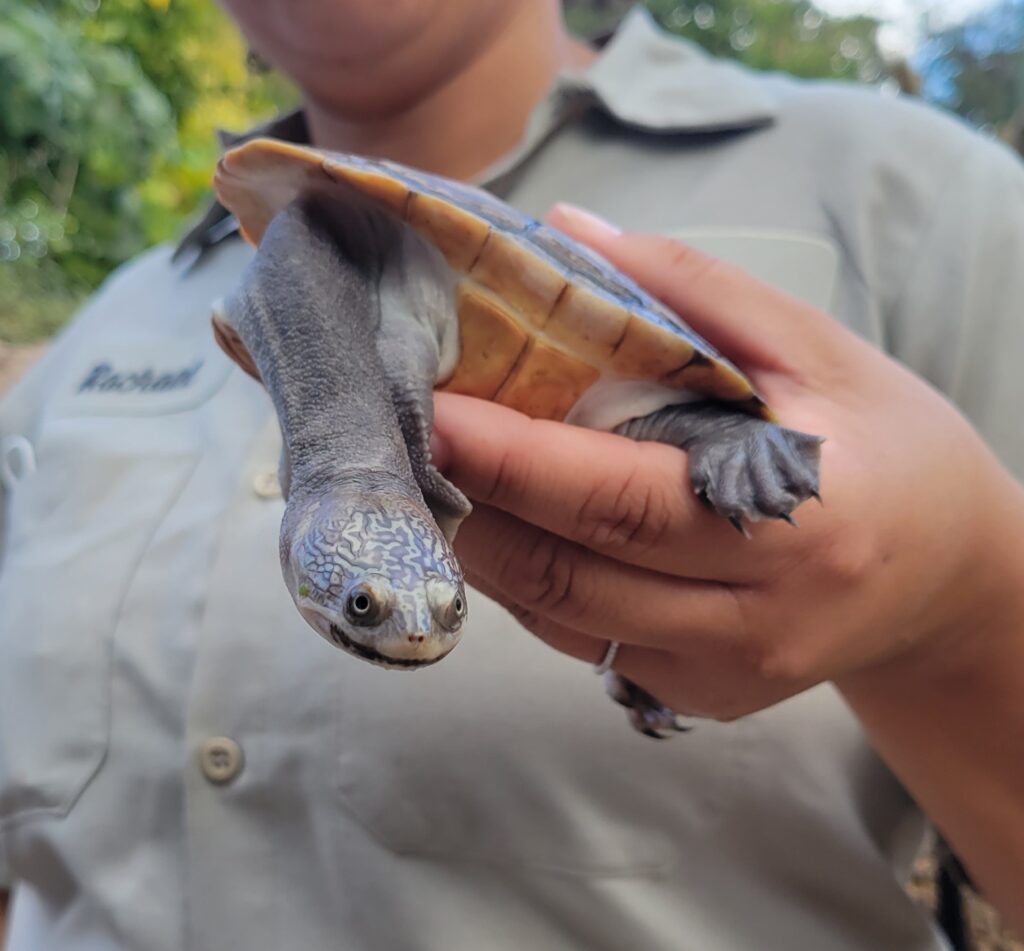
From the first second Ms. Walton started talking about her career, you could notice the true passion and adoration she has for reptiles. After working at the Zoo for 10 years, she has incredible memories, from being chosen for a Madagascar conservation project, to filming for Animal Planet. Her favorite part of her job includes talking to guests so she can share her passion and raise awareness that reptiles deserve as much appreciation and attention as other animals. When asked what her favorite reptile is, she answered that it depended on the day due to each reptile being so unique. She mentioned rattlesnakes are one of her favorites but, unfortunately, they are not cuddly and Ms. Walton definitely enjoys showing her love for animals. Therefore, the caiman lizard and Asian giant toad are next in line. As we visited both of these animals you could see the genuine fondness and care she had for them. Ms. Walton works with a variety of reptiles but she has developed a personal soft spot for iguanas due to running the Fijian Iguana Project for the past nine years. By providing breeding recommendations based on genetic matching and excellent overall care for individuals, she is helping to ensure the long term sustainability of this species. She also enjoys the opportunity to help younger people figure out their passion and mentor them towards a career fit for them. Just by meeting Ms. Walton for a few hours, you can recognize her kind heart in all aspects as she cares for wildlife and inspires younger generations to pursue their dreams.
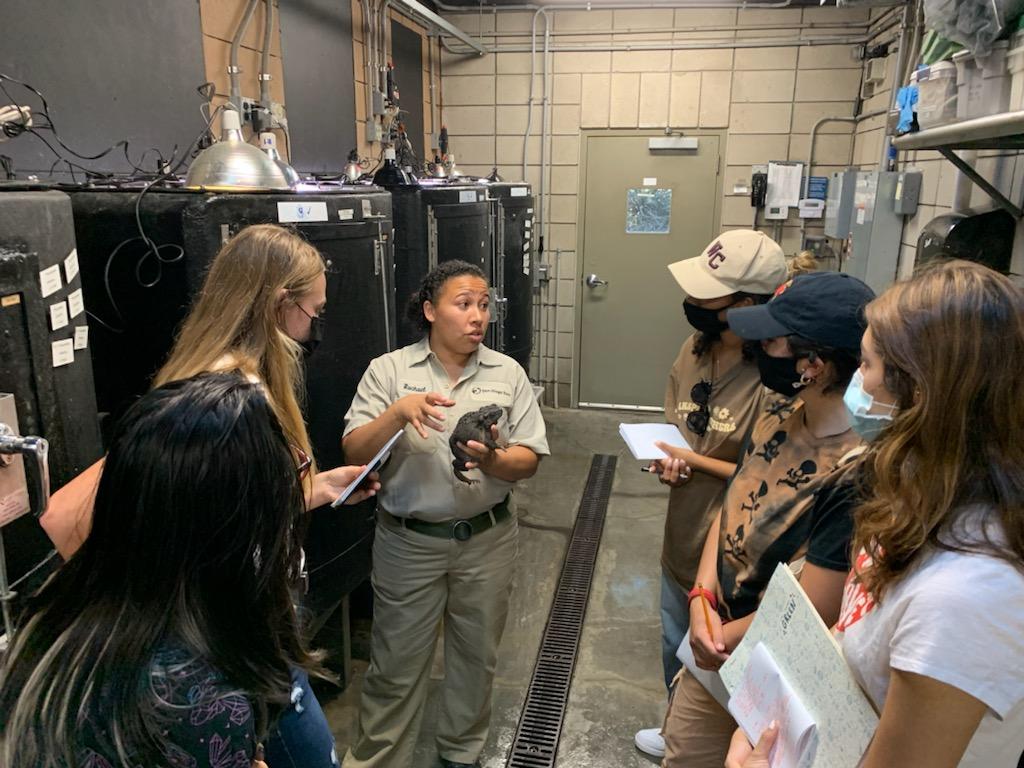
As a reptile specialist, Ms. Walton’s job includes managing multiple species ranging from frogs to snakes. However, her favorite will remain the turtles and tortoises. She loves their demeanor and cuddly nature. Ms. Walton’s favorite type of tortoise is the radiated tortoise. Native to Madagascar, the radiated tortoise is a critically endangered species. This tortoise’s population has decreased due to poaching and habitat destruction. Many find these tortoises enjoyable to eat then later trade and sell their shells. Being sold as pets is quite popular as well. In the beginning of 2018, 11,000 radiated tortoises were confiscated by the Turtle Conservancy and Turtle Survival Alliance, and was one the largest animal confiscations. After the seizure of these tortoises, these organizations banded together to save these tortoises. The project’s goal was to rehabilitate and release the tortoises back into their native habitats. The project was separated into multiple waves of expert volunteers, each tasked with different objectives. Ms. Walton was lucky enough to join the second wave where they specialized in setting up proper care protocol and treating sick or injured tortoises. Other waves of staff worked diligently to ensure the rehabilitation of these tortoises. In 2020, 1,000 radiated tortoises were released back into their native habitat. This may not seem like a significant amount, but they will be intentionally released in waves over the next few years in order to not overwhelm the resources of the habitat. With more work and help from the world, these tortoises can be stable again. In Ms. Walton’s words, by staying informed and sharing information you are part of an important process of keeping people aware. Being aware is the strongest action you can take. To learn about more ways you can get involved and save more tortoises go to https://turtlesurvival.org/get-involved-2/.
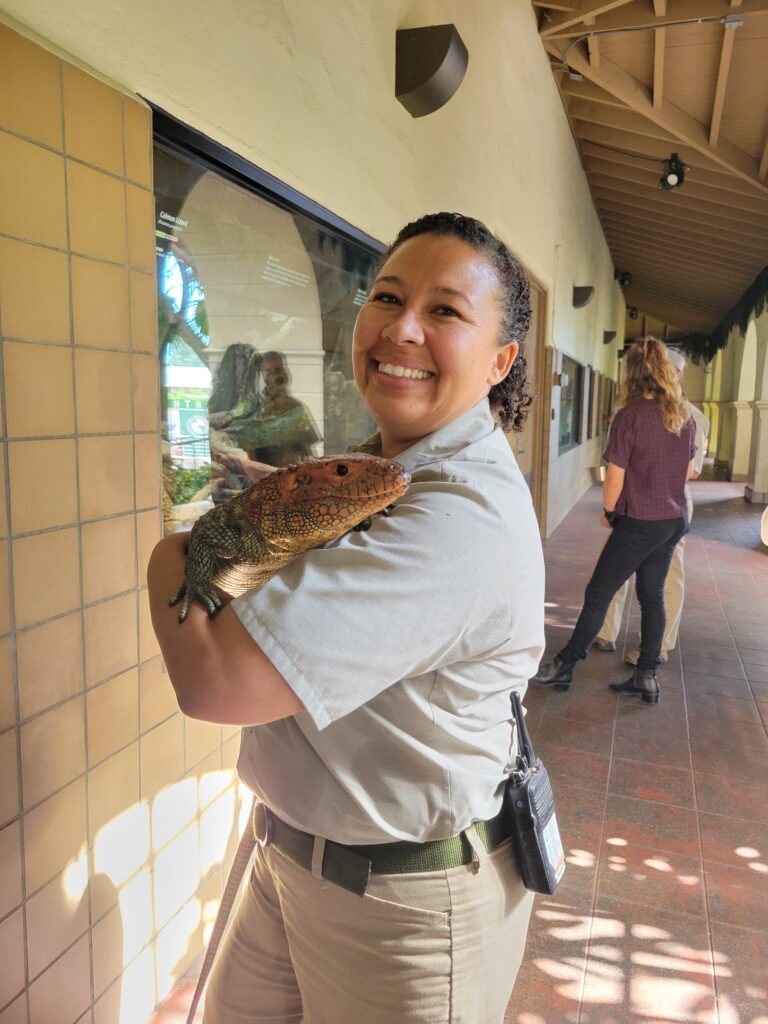
Despite Ms. Walton’s love for turtles and tortoises, she holds a deep connection to a large caiman lizard named Martin. Ms. Walton is one of Martin’s specialists at the Zoo, meaning she helps train him and works with him regularly. The interns took notice of his beautiful red scales along his head, which we learned are distinct from a female. Caiman lizards are sexually dimorphic, meaning their size and coloration vary depending on their gender. This is a common trait among the tegu family, a carnivorous group of lizards. Unlike their kin, caiman lizards only hunt by foraging as they don’t have sharp teeth. Instead they use their rounded teeth and muscular jaws to crush snails, clams and similar prey. Their natural predators include jaguars, larger crocodilians, and anacondas. Because of this, caiman lizards spend most of their time over open water on branches or trunks so that if they are being pursued, they can simply fall into the water and swim quickly away. Ms. Walton provides opportunities for them to exhibit natural behaviors such as foraging through habitat design and enrichment. The caiman lizards are also specially trained to avoid conflict with one another and minimize food aggression during feeding and handling. They are highly food motivated so they get positive reinforcement for performing specific behaviors during training. Along with the care provided by the Zoo, Ms. Walton helps to breed the lizards and raise their young, providing opportunities for these animals to increase their population numbers even more.
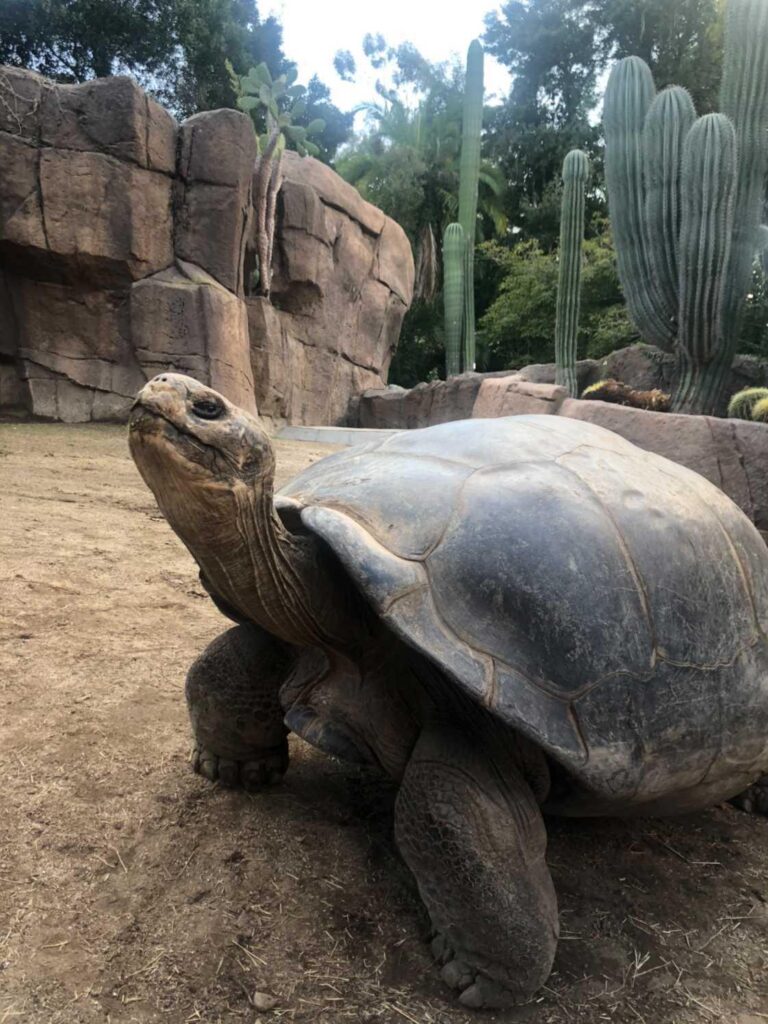
Throughout today’s presentation, Ms. Walton took the time to speak individually with the interns to talk about their passions and give wise advice for their futures. She gave the interns the same advice she received when she was in their shoes exploring careers, “Not everything you learn is at school. It is important to do research, it is important to read books, and it is important to network”. She advised the interns that hands-on experience is just as important as academics, and internships are a great way to receive experience and be successful at their future job. As Ms.Walton ended her presentation she assured the interns that changing their dreams and passions is completely normal, “Your passion is not always your purpose”. Ms. Walton is an amazing and genuine person that has touched everybody’s heart through her kindness and devotion, and will be remembered forever by the interns.
The interns had a great time visiting the reptiles and amphibians, and learning about how Ms. Walton provides opportunities for the animals in her care to thrive. Her work with these numerous species through breeding, conservation, and outreach is incredibly valuable to the Zoo’s conservation goals. Ms. Walton’s devotion to reptiles is inspiring and the interns could not have been more excited to meet her and the many animals she brought out today.
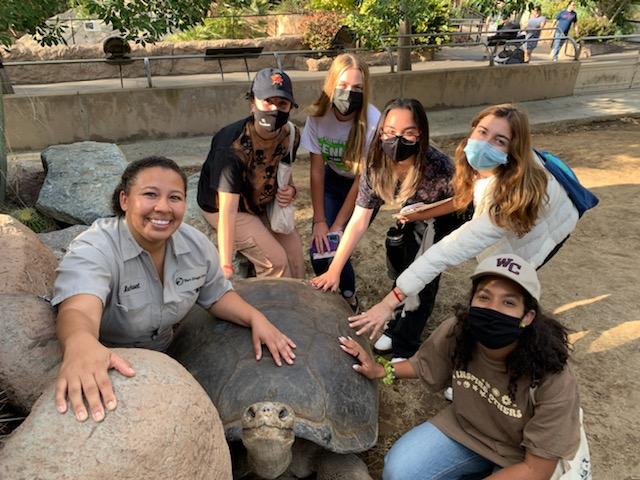
Week Two, Fall Session 2021


